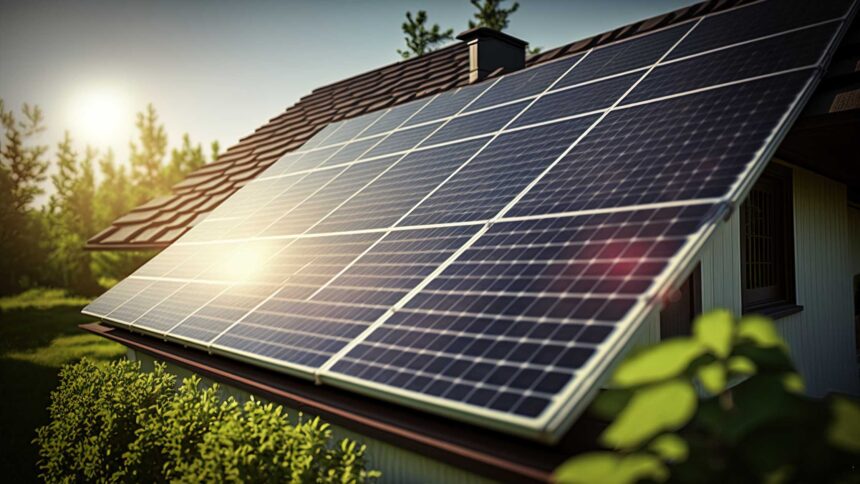What is a Solar System Appliance?
The term solar system typically conjures images of distant planets and starry skies. But what if we reframed this concept for a more down-to-earth application? While a traditional solar system might seem far removed from a household appliance, advancements in technology are blurring the lines. This article explores the concept of a solar system as a home appliance.
How does it work?
A solar appliance, essentially, refers to a collection of technologies that convert sunlight into usable electricity for your home.
- Solar Panels: These panels act as workhorses, capturing sunlight using photovoltaic cells. These cells transform sunlight into direct current (DC) electricity.
- Inverter: DC electricity isn’t compatible with most household appliances. The inverter transforms the DC current from the panels into alternating current (AC) electricity, the kind used in your home.
- Battery (Optional): While not always necessary, batteries can store excess solar energy generated during the day for use at night or during peak grid demand times.
- Monitoring System (Optional): This allows you to track your system’s performance, monitor energy production and consumption, and optimize its efficiency.
Types of Solar System appliances:

There’s no one-size-fits-all solution when it comes to solar systems. Here are some common configurations:
- Grid-Tied Systems: These connect directly to the power grid. The surplus energy produced by your panels feeds back into the grid, potentially earning you credits on your electricity bill.
- Off-Grid Systems: Suitable for remote locations, these systems store all generated solar energy in batteries for independent power supply.
- Hybrid Systems: Combining grid connection with battery storage, these offer flexibility and backup power during outages.
Advantages and Disadvantages of Solar System Appliances
Planetary systems like ours offer some distinct advantages:
- Reduced Electricity Bills: Generate your own clean energy and potentially lower your reliance on the traditional grid.
- Environmentally Friendly: Solar power is a renewable resource that helps combat climate change by reducing dependence on fossil fuels.
- Increased Home Value: Homes with solar systems often attract higher market value due to energy savings and environmental benefits.
- Energy Independence: Off-grid systems offer greater control over your power source, especially in areas with unreliable grid access.
However, there are also potential disadvantages:
- Upfront Cost: Installation costs can be high, though government incentives and rebates can help offset these.
- Weather Dependence: Solar energy production relies on sunlight, so efficiency can be impacted by weather conditions.
- Limited Nighttime Use: Without battery storage, solar systems primarily generate power during daylight hours.
- Space Requirements: Installing solar panels requires sufficient roof space or dedicated land area.
Importance of Solar System appliances
Solar system appliances are not just about saving money on electricity bills; they represent a shift towards a more sustainable future for our homes. Here’s why they matter:
- Combating Climate Change: By reducing reliance on fossil fuels, solar power helps mitigate greenhouse gas emissions and climate change impacts.
- Energy Security: Solar systems offer a hedge against rising electricity costs and dependence on volatile energy markets.
- Increased Energy Independence: Generating your own clean energy empowers you to take control of your power needs.
solar system applications with examples
Solar system appliances are finding increasing applications in homes across the globe. Here are some examples:
- Powering Everyday Appliances: From lights and refrigerators to TVs and computers, solar energy can run a significant portion of your home’s electrical needs.
- Heating and Cooling: Solar-powered water heaters and HVAC systems with battery backup are becoming more prevalent.
- Electric Vehicle Charging: Generate clean power to charge your electric vehicle, reducing reliance on fossil fuels for transportation.
Solar System Appliances Companies in India
India is experiencing significant growth in the solar energy sector. Here are some leading solar system companies in India.
- Bharti Solar
- Tata Power Solar
- Jackson Engineers Limited
- Mahindra Solar
- Sukam Solar
- Waaree Energies Ltd.
- Tata Power Solar
- Blue star
Precautions while using Solar System Appliances

While solar systems offer numerous benefits, some precautions are essential. They are
- Proper System Design and Installation: Ensure a qualified professional designs and installs your system for optimal performance and safety.
- Roof Suitability: The roof’s structural integrity and sun exposure are crucial factors to consider before installation.
- Regular Maintenance: Periodic cleaning and maintenance will ensure your solar system functions efficiently.
Conclusion:
The concept of a solar system appliance is no longer science fiction. As technology advances and costs decrease, solar power is becoming a viable and attractive option for homeowners. By harnessing the sun’s clean energy, you can not only reduce your electricity bills and environmental impact but also pave the way for a more sustainable future for your home and the planet. Carefully consider your needs, research reputable companies, and explore available incentives to make an informed decision. Embracing solar power might just be the first step towards a more empowered and sustainable future for your home.




